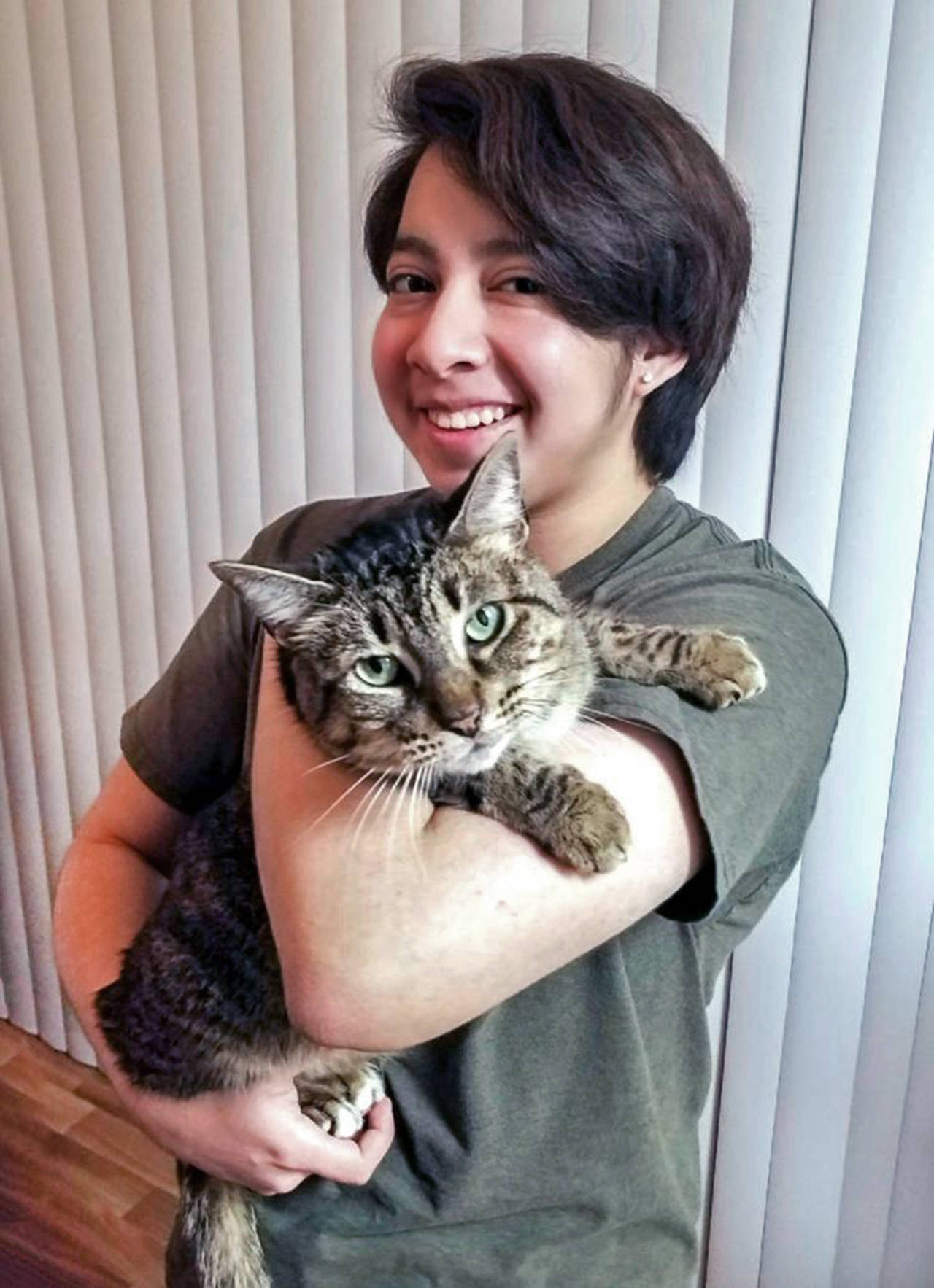PENDLETON, Ore. — Antonio Martinez had only a glimmer of hope that he would ever see his cat again.
One day in September, he stopped to stretch his legs at the Deadman Pass rest area 18 miles east of Pendleton on Interstate 84. He and his father had driven from Texas and were on their way to Beaverton, where Antonio was moving. Korra, his 4-year-old tabby cat, had meowed unhappily the entire trip. When Martinez got out, his cat saw her chance, slipping unseen through the open door. Martinez didn’t notice she was gone until he got back into the car.
“It was too quiet,” he said.
He and his father searched the rest area for a long while, but finally had to continue on. Martinez posted details about Korra’s escape on the Eastern Oregon Pet Lovers Facebook page and contacted the Pendleton Animal Welfare Shelter (known there as PAWS) to leave information about his cat.
“She has a bit of an attitude,” he said, “but she’s friendly and can be sweet and really affectionate.”
After he moved into his new Beaverton home, “I started to lose a bit of hope, especially with the colder months coming up,” Martinez said. He didn’t dare ponder Korra’s chances against coyotes, hawks and other predators.
Weeks passed with no word.
Then, on the evening of Nov. 19, Robert and Teresa Holt stopped at the Deadman Pass rest area on their way home to Aberdeen from a family gathering in Utah. As they pulled into a parking space, Robert spotted a tabby cat in the headlights. She had no collar, and the temperature was dropping into the 30s.
The couple and the three children traveling with them, ages 5 to 8, got out to see if they could coax the kitty into their car. Korra allowed Robert to pick her up, but quickly jumped down again.
“It was kind of loud, with all the trucks in the rest area,” said Teresa. “Her tail was all flared out, and you could tell that she was not comfortable.”
Their son still had part of a ham sandwich from earlier that evening, so he pulled that out to entice the cat.
“She gobbled that right up and then kept coming over to us,” said Teresa, and so Robert was able to pick her up again and get her into their car.
“At first, she acted like she wanted to get out,” said Teresa. “But we just sat there for a little bit, and she climbed onto my lap, and then climbed into the back (with the kids), and eventually she got pretty comfortable.”
As Korra settled down, Teresa posted a call for help on Facebook. It was after 8 p.m., so she knew any nearby animal shelters would be closed for the night; and they were still a long way from home. In response to her post, one of her friends sent them the contact information for Cat Utopia in Pendleton.
They left a message at the shelter’s phone number and shortly thereafter received a call back from President Cindy Spiess, who arranged for volunteer Doreen Akhtar to meet them along their route.
“By that time, Korra had settled down and was purring,” said Teresa. “She was a very sweet kitty. You could tell that she belonged to someone and was loved.”
After the handoff, the Holts continued their trek home to Aberdeen and Korra spent the night at Akhtar’s house.
The volunteer took Korra to the Pendleton shelter in the morning to see if she had a microchip implanted.
“Part of the protocol is to check for a microchip,” said shelter manager Michelle Glynn. “She was microchipped, which was awesome. Thankfully, the owner had also updated the information on the chip.”
The microchip company where Korra is registered, Petlink.net, sent a text and an email to Martinez notifying him that his cat had been located.
“I was just really shocked, but also so happy,” he said.
The following day, Akhtar drove the cat to the Petco store in Clackamas to meet Martinez, who wondered how Korra would react to seeing him after being away two months.
“I was worried she might not recognize me,” he said, “but as soon as she sniffed my hand, she immediately started purring.”
Korra has since settled into Martinez’s new home in Beaverton, where she is recovering.
“She actually lost of lot of weight. She was skin and bones,” Martinez said. “She is gaining it back slowly and seems pretty hungry.”
He did reach out to thank the Holts for helping Korra.
“He contacted me through Facebook Messenger. He told me what his story was, and how they’d lost the cat,” said Teresa. “He said it was pretty great to have Korra home.”
Glynn hopes this happy ending will convince other cat owners to consider microchipping their animals.
“The first thing we do in the shelter when we receive a stray animal is to scan for a chip,” she said. “It’s become standard protocol in veterinary and shelter communities.”
This article originally appeared in the East Oregonian. Kat Bryant of Grays Harbor News Group contributed to this version.


